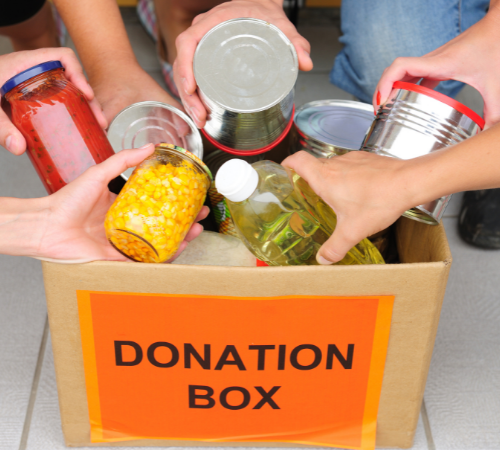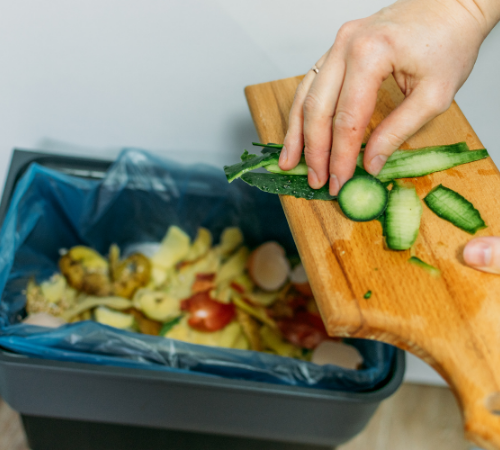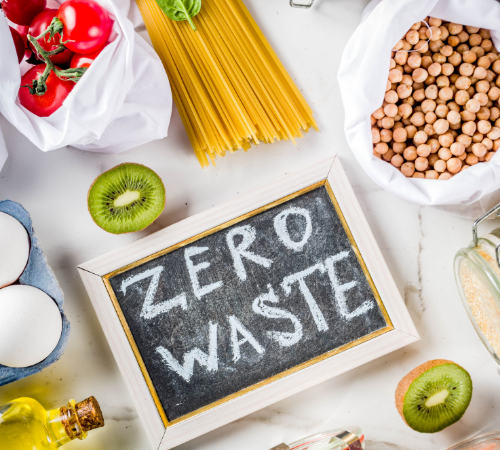The 2021 UNEP Food Waste Index Report highlights that around 931 million tonnes of food waste was generated in 2019 globally. This equates to around 17% of total global good production being wasted and can also be associated with 8-10% of global greenhouse gas emissions. In fact, if food waste were a country, it would be the third-largest producer of CO2 after the USA and China.
In the UK specifically, around 9.5 million tonnes of food is wasted, 70% of which was intended to be consumed. This has a value of over £19 billion a year and would equate to over 25 million tonnes of greenhouse gas emissions.
The fact that substantial amounts of food are produced but not eaten by humans has great environmental, economic, and social impacts. For example, food waste exacerbates food insecurity, and is a major contributor to climate change, nature and biodiversity loss, pollution, and waste. This is why the “food waste index” is part of the UN’s sustainable development goals (SDGs). SDG 12.3 aims to halve food waste and reduce food loss by 2030.
There are some great successes in reducing food waste so far. For example, the United Kingdom is the first country to get more than halfway towards meeting the target, where food and waste levels were reduced by 27% from 2007 – 2018. However, the success is not at the scale needed to achieve the target, and much more can be done.
Every UK business produces food waste which often goes to landfill or incineration. In fact, as of 2019, just 14% of the UK’s food waste was recycled. Reducing food waste can not only help your SME cut costs and become greener, but also help contribute towards bigger UK environmental targets, such as the SDG 12.3 food loss target, or reducing greenhouse gas emissions. So, whether your business is focused on operational benefits, appealing to consumer tastes, boosting company reputation, or protecting the planet – reducing food waste could benefit your business.
There are many ways small businesses can reduce the amount of food waste produced in their business. We’ve come up with 3 simple and inexpensive ways of how you could reduce food waste in your workplace:
To find out more about how your SME can reduce food waste, read about each method below.
Even if your business is already aiming to reduce the amount of food waste it produces, such as through smarter purchasing or inventory management, naturally there will still be some waste. Often leftovers may be left in the kitchen or forgotten about, or simply thrown away. However, there are many other ways that SMEs can tackle those inevitable leftovers instead of letting them go to waste.
One way that your business can tackle this is by using any leftover food to create something new. For example, if your SME has a fruit bowl in the break room, any browning or unwanted fruit could be blended to make breakfast smoothies for the office. Not only is this a great way to make use of leftover food, but it also allows your SME to do something good for your employees. For some more leftover recipe inspiration, visit WRAP’s Love Food Hate Waste recipe page.
As well as this, if you own a bakery, coffee shop, takeaway, restaurant – or any business type that sells food products to consumers – you will likely have a lot more unavoidable leftover food items. One way your SME may be able to make use of these items is through food waste apps. For example, Too Good To Go sources perfectly good food from businesses that otherwise might be destined for landfill, and allows consumers to purchase them at discounted prices. Overall, this is a win for your business, a win for the consumer, and a win for the environment too.
If your business cannot make use of the leftovers in these ways, you may also consider donating the unwanted food items. For example, The Trussell Trust supports a nationwide network of food banks and provides emergency food and support to those in poverty in the UK. Your business could donate items such as pasta, soup, fruit juice, biscuits, coffee and more. This way, your food items do not go to waste, and your business can do its part to help also help struggling individuals and families have access to nutritional meals.
What can SME’s do with leftover food waste?

However, sometimes the leftover food or food waste is not usable and cannot be donated, for example, if it is expired or inedible. Instead of sending this waste to go to landfill, businesses have the opportunity to recycle their food waste. Depending on your business requirements and the amount of waste produced, this could be through organised food waste collection or via kerbside collection.
Recycled food waste is often converted into energy and fertiliser via anaerobic digestion. This is where food waste is put into an anaerobic digester and micro-organisms break down the food waste to produce biogas (a mixture of methane and carbon dioxide). This gas is a source of renewable energy, and can be used to produce heat, electricity, or transport fuels. There is also a by-product of bio-fertiliser, which can be used as a natural fertiliser in farming.
However, when food waste is sent to landfill (e.g. if it is disposed of in general waste), the waste is broken down in the same way, but the biogas produced is released into the atmosphere. With methane being 28 times more damaging than carbon dioxide, this could have significant impacts for global warming and climate change.
Therefore, the environmental benefits to recycling your business waste is clear. However, simply having food bins may not translate into recycling in practice. To help reduce food waste within your SME, ensure that you have food bins located near to where the majority of your organics are produced, such as the kitchen. Clear signs on each type of waste bin may also be helpful to prevent contamination, including what items can and cannot be placed into the food waste bin.
Tips for encouraging the recycling of food waste within your SME:

Getting creative with leftover food items and recycling food waste are just two things that your SME can do to help with the food waste problem. However, these things will only work if you also have buy-in from your team. For example, if your employees are not aware of your company’s efforts, then they may place unwanted food items into the incorrect bin. Therefore, ensuring that your staff are aware, engaged, and motivated will provide the best results for your business – and for the environment.
Firstly, spreading awareness about why food waste is important to your business, your employees, and the environment is key. Food waste is a multi-faceted issue, and different employees may have different motivations on why they care about food waste in your business – whether that is environmental, economic, or social.
Once you know what your employees care most about, you can measure impact in a meaningful way. For example, if your employees are environmentally-focused, you could calculate the CO2 equivalent your business has prevented over time – or if they are socially-focused, you could report on the amount donated or raised for food banks. This could motivate your team to want to meet the targets.
As well as this, an important aspect of motivating and encouraging your team to involve themselves in your SME’s food waste targets would be positive reinforcement. For example, you could incentivise your team to achieve certain targets and celebrate any milestones achieved.
How can SME’s motivate and engage staff to reduce business food waste?

There are many ways that you can make your business more sustainable. There may be some simple changes you could make in your business, such as recycling, changing your light bulbs or cutting down on single-use items.
If you’d like to find out more on how you can make your business more sustainable, check out our blogs below:
Six ways to green your business and save money
Four tips on how to save energy during the winter months
Five ways SMEs can encourage their employees to recycle